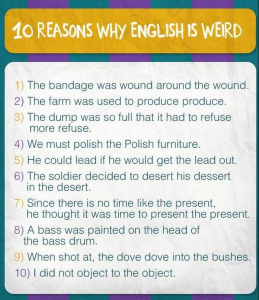Is English Difficult to Learn?
Not necessarily. The correct tools can make learning English much easier for people. Additionally, having the right tools and the right approach to learning English can help young children learn to read much more quickly and easily.
Some languages are considered more difficult to learn than others. The reasons for this can vary depending on the language. The use of characters (as opposed to an alphabet) such as in the Japanese and Chinese languages can make them difficult for some people to learn. The Arabic language uses an alphabet that is very different from that used with English, which is one of the reasons it is usually difficult for westerners to learn. Other languages can be considered difficult to learn due to complicated grammar, sentence structure and word derivation as in the Finish and German languages.
While English does not have some of the characteristics that make some other languages difficult, it does have its own problems, difficulties and barriers due to the fact that it has so many contradictions, and exceptions to its own rules. Why is this so?
Evolution of the English Language
English is derived from many different languages and cultures. The most basic root, the language we know as Old English, was made up of a combination of languages that originated from what is now known as Germany and other northern European territories. Later, the Vikings (people from Denmark, Norway and other northern countries), added their influence to the language. Then the Normans, a French speaking people, invaded and ruled England for several hundred years and after them came the influence of Latin and Greek during the time of The Renaissance.
In addition to the evolution of English as spoken in England, there is the development of the English language in America – American English. The language in America has been influenced deeply by Native American languages as well as by French and Spanish. Additionally, there have been influences from West Africa, India and many other parts of the world.
As one can see, English is derived from many cultures and languages, each with its own peculiarities. That is why there are so many rules needed to master the language. There are rules for punctuation, spelling, pronunciation, syllable emphasis, grammar, sentence structure, essay format, writing style, etc. To be fluent in the language one has to not only know all of the rules, but also all of the exceptions to those rules. A simple online search can find numerous (and often humorous) examples of such rules and exceptions. See a couple of them below:


Reading, Phonics and English
While there are many rules one must know to master the English language, one basic requirement that must be in acquired is an understanding of all the phonetic sounds made by each letter and combination of letters in the alphabet when forming words. English is a phonetically based language. This applies to both the verbal as well as the written forms. For language mastery, it is essential that students learn all of the various phonetic sounds made by each of the letters of the alphabet as well as those made by the various groups of letters such as the letters “ough” in the words “thought” and “through” or the letters “eigh” as in the words “eight” or “height.”
Correct application of phonics is essential for reading fluency as well as for correct pronunciation, comprehension and vocabulary building. There are many phonics programs, apps, books, videos, flash cards, etc. Some of these tools are good; some are not. One thing that is unique about the two sets of cards available from Success Reading is that they emphasize the pronunciation of the vowel sounds. Not understanding this differentiation can lead to children (and even adults) not correctly pronouncing some words and often not understanding them. (Examples are words such as “then” and “than” or “pin” and “pen.”) Another point that makes the Success Reading cards different from others is that they cover the various “letter teams” and the various sounds they make such as: ee, sh, th, tch, ph, ou, and others. Some other phonics programs cover these but not all do.
Anyone wishing to learn the English language should learn all of the phonics sounds associated with the language. Parents wishing to help their children learn to read fluently with comprehension should help them master phonics.
Can I Teach My Child to Read?
To help a child master phonics one does not need to go through years of extended training, at least not if one uses the Success Reading Basic and Advanced Phonics Cards and the Success Reading Phonics Game Cards. These cards have easy to follow instructions and were designed for ease of use for parents and educators wishing to help children learn to read.
To learn more about these two sets of phonics cards or to purchase them, visit our website: www.successreading.org. Both sets of cards are also from Amazon.com using the following links:
Basic and Advanced Phonics Cards: http://ow.ly/N1419
Phonics Game Cards: http://ow.ly/N14o4
Funny Phonics Lessons
Since we’re discussing the English language, phonics and reading instruction, I thought I’d add the link to a short video clip showing some “Old School” phonics Instruction for your entertainment. Enjoy!

Link: https://www.youtube.com/watch?v=bgmdnxtz3Bo
(The YouTube link above is an excerpt from a 1938 movie short entitled, Violent is the Word for Curly, featuring, of all people, The Three Stooges.)
Some parents may be interested to know that there are steps they can take with their children at very early stages of development which will help prepare them for when they start learning to read. Doing these steps makes learning to read much faster and easier for children. Learn more: http://ow.ly/RLJgF
To share this blog with others that may be interested or that could possibly find the information useful, use this link: http://ow.ly/SXABT
Thank you very much,
The Success Reading Team
Please like our website at: www.successreading.org







Leave a Reply